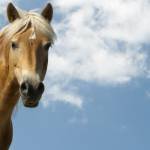Riding Your Horse at High Elevations

Trail riding in the mountains…it sounds like the perfect way to get away, spend time with your riding buddies, and enjoy beautiful scenery. To ensure that your experience is as wonderful as your plans, keep these tips in mind.
Remember that when you gain even a few thousand feet in elevation, the oxygen content in the air decreases. You might not feel a big difference as you’re riding, but your horse will respond by breathing harder and faster, moving more slowly, and getting fatigued sooner into the ride than normal. Watch for these signs, especially in horses that are older, overweight, or in less fit condition, and don’t ask too much of your horse.
You can minimize the problems somewhat by having your horse in top athletic shape before the trip and by arriving at the higher elevation a day or two before the big ride. Taking some easy rides will help both you and your horse to adapt, but this amount of time won’t be sufficient to eliminate all effects of limited oxygen.
Trails in the mountains may be somewhat challenging. Footing can be loose, surfaces may slope toward dropoffs, and you could encounter water, snow, and other conditions that make you nervous. Don’t be shy about getting off and leading your horse through tricky spots, though this means you will have to remount a possibly nervous horse later. You have a responsibility to yourself and your horse to turn around and call it a day if you are facing a situation that seems unsafe. Discuss these choices with your trail mates before the trip so that you will not be tempted to “tough it out” and end up in trouble.
Weather is a little trickier in the mountains than it is in the flatlands. The air will be cooler as you climb, so take an extra jacket along. Thunderstorms and dangerous lightning can occur without warning, and in some areas, snow is possible in every month of the year. If possible, start your ride early in the day and plan to return to lower elevations by mid-afternoon. Nights can be quite a bit cooler with even a moderate gain in elevation; will your horse need a blanket at night?
Spread your feedings through the day so that your horse has a chance to eat several small grain meals rather than one large one. Allow him to nibble hay or grass whenever he’s not being worked. Be sure fresh, clean water is always available.
Travel, strange surroundings, a different schedule, and hard work are challenges that may upset your horse’s digestive system. Consider giving the horse a gut conditioner before and during your trip, and watch for the earliest signs of discomfort.








